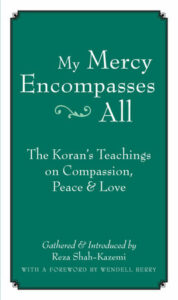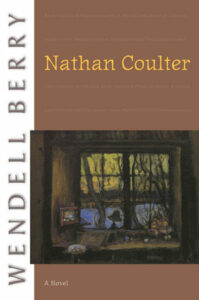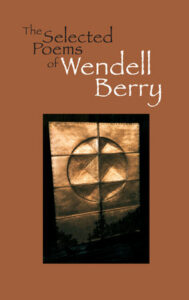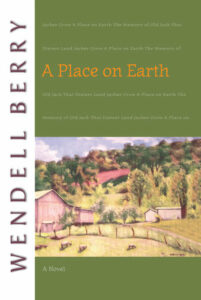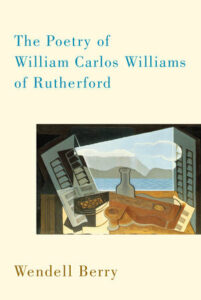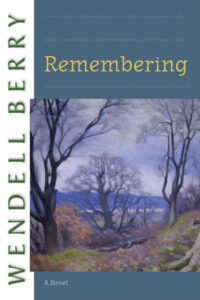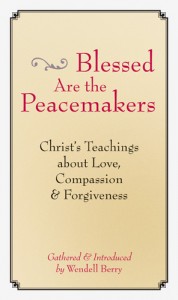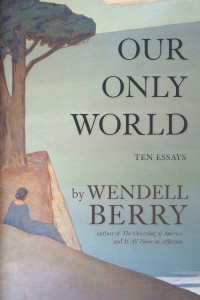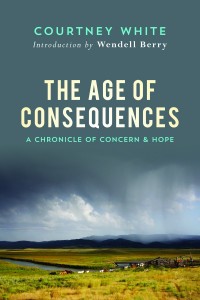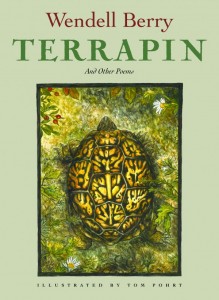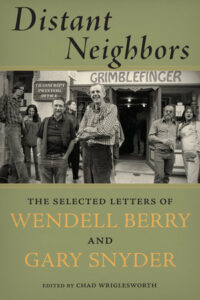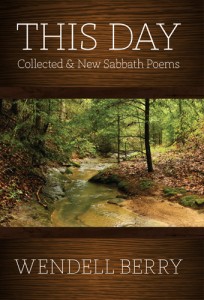Wendell Berry
Wendell Berry is the author of fifty books of poetry, fiction, and essays. He was recently awarded the Cleanth Brooks Medal for Lifetime Achievement by the Fellowship of Southern Writers and the Louis Bromfield Society Award. For over forty years he has lived and farmed with his wife, Tanya, in Kentucky.
Subscribe to our newsletter for news & events from Counterpoint Press.
Books
My Mercy Encompasses All
The Koran's Teachings on Compassion, Peace and Love
If the concept of divine unity dominates the mind, it is the principle of divine compassion that rules the heart in Islam. Contrary to the harsh stereotypes of Islam–fostered both by fanatics within the religion itself, and by biased critics–the culture of this religion is steeped in the ambience generated by mercy and compassion, expressions of divine love. This spiritual culture issues from heartfelt conviction that God is to be taken absolutely seriously when he declares in the seventh chapter of the Koran, "My mercy encompasses all."Drawn from his own translations of the text, scholar and author Reza Shah–Kazemi has selected key verses from the Koran which manifest the various facets of this mercy, a mercy which bestows profound peace and infinite love. In the spirit of Blessed Are the Peacemakers, Wendell Berry's collection of quotations from the Bible, here is a book to help us illuminate an immensely influential text
Nathan Coulter
A Novel
Nathan Coulter, Wendell Berry’s first book, was published in 1960 when he was twenty–seven. In his first novel, the author presents his readers with their first introduction to what would become Berry’s life’s work, chronicling through fiction a place where the inhabitants of Port William form what is more than community, but rather a “membership” in interrelatedness, a spiritual community, united by duty and bonds of affection for one another and for the land upon which they make their livelihood.When young Nathan loses his grandfather, Berry guides readers through the process of Nathan's grief, endearing the reader to the simple humanity through which Nathan views the world. Echoing Berry's own strongly held beliefs, Nathan tells us that his grandfather's life “couldn't be divided from the days he'd spent at work in his fields.” Berry has long been compared to Faulkner for his ability to erect entire communities in his fiction, and his heart and soul have always lived in Port William, Kentucky. In this eloquent novel about duty, community, and a sweeping love of the land, Berry gives readers a classic book that takes them to that storied place.
The Selected Poems of Wendell Berry
This poetry collection about nature, community, and tradition is a stunning primer on the poetic works of the award-winning Kentucky writer, environmentalist, and cultural critic.The Selected Poems of Wendell Berry gathers one hundred poems written between 1957 and 1996. Chosen by the author, these pieces have been selected from each of nine previously published collections. The rich work in this volume reflects the development of Berry’s poetic sensibility over four decades.
Focusing on themes that have occupied his work for years—land and nature, family and community, tradition as the groundwork for life and culture—The Selected Poems of Wendell Berry celebrates the broad range of this vital and transforming poet.
A Place on Earth
Published in 1967, we return to Port William during the Second World War to revisit Jayber Crow, the barber, Uncle Stanley, the gravedigger, Jarrat and Burley, the sharecroppers, and Brother Preston, the preacher, as well as Mat Feltner, his wife Margaret, and his daughter–in–law Hannah, whose son will be born after news comes that Hannah’s husband Virgil is missing."The earth is the genius of our life,” Wendell Berry writes here. “The final questions and their answers lie serenely coupled in it."
The Poetry of William Carlos Williams of Rutherford
A “superb study” that “reminds us that Williams remains our contemporary not only for the lively cadences and fresh imagery that animate his poems, but for the ethical imperative of his example” (The Sewanee Review).Acclaimed essayist and poet Wendell Berry was born and has always lived in a provincial part of the country without an established literary culture. In an effort to adapt his poetry to his place of Henry County, Kentucky, Berry discovered an enduringly useful example in the work of William Carlos Williams. In Williams’ commitment to his place of Rutherford, New Jersey, Berry found an inspiration that inevitably influenced the direction of his own writing.
Both men would go on to establish themselves as respected American poets, and here Berry sets forth his understanding of that evolution for Williams, who in the course of his local membership and service, became a poet indispensable to us all.
“Generously quoting many of Williams’ best lines . . . Berry produces a work of aesthetics more than evaluation, of love more than critique.” —Booklist
Remembering
A Novel
A poetic novel of despair, hope, and the redemptive power of work deepens an award–winning author’s grand Port Williams literary project.After losing his hand in an accident, Andy Catlett confronts an agronomist whose surreal vision can see only industrial farming. This vision is powerfully contrasted with that of modest Amish farmers content to live outside the pressures brought by capitalist postindustrial progress, and by working the land to keep away the three great evils of boredom, vice, and need.
As Andy’s perspective filters through his anger over his loss and the harsh city of San Francisco surrounding him, he begins to remember: the people and places that wait 2,000 miles away in his Kentucky home, the comfort he knew as a farmer, and his symbiotic relationship to the soil. Andy laments the modern shift away from the love of the land, even as he begins to accept his own changed relationship to the world. Wendell Berry’s continued fascination with the power of memory continues in this treasured novel set in 1976.
“[Berry’s] poems, novels and essays . . . are probably the most sustained contemporary articulation of America’s agrarian, Jeffersonian ideal.” —Publishers Weekly
“Wendell Berry is one of those rare individuals who speaks to us always of responsibility, of the individual cultivation of an active and aware participation in the arts of life.” —The Bloomsbury Review
Blessed Are the Peacemakers
Christ's Teachings About Love, Compassion and Forgiveness
Unfortunately, on occasions too frequent and destructive to enumerate, the teachings of Christ have been either ignored or distorted by the very people calling themselves Christian. Whether directed towards social intolerance or attitudes of warlike aggression, these right–wing citizens have claimed a power of influence that far exceeds their numbers. Blessed Are the Peacemakers collects the sayings of Jesus, selected by Wendell Berry, who contributes an essay of introduction. This is a book of inspiration and prayerful compassion, a ringing call to action at a time when our country and the world it once led stand at a dangerous crossroads.Our Only World
Ten Essays
"Stern but compassionate, author Wendell Berry raises broader issues that environmentalists rarely focus on . . . In one sense Berry is the voice of a rural agrarian tradition that stretches from rural Kentucky back to the origins of human civilization. But his insights are universal because Our Only World is filled with beautiful, compassionate writing and careful, profound thinking." —Associated PressThe planet's environmental problems respect no national boundaries. From soil erosion and population displacement to climate change and failed energy policies, American governing classes are paid by corporations to pretend that debate is the only democratic necessity and that solutions are capable of withstanding endless delay. Late Capitalism goes about its business of finishing off the planet. And we citizens are left with a shell of what was once proudly described as The American Dream.
In this collection of eleven essays, Berry confronts head–on the necessity of clear thinking and direct action. Never one to ignore the present challenge, he understands that only clearly stated questions support the understanding their answers require. For more than fifty years we've had no better spokesman and no more eloquent advocate for the planet, for our families, and for the future of our children and ourselves.
The Age of Consequences
A Chronicle of Concern and Hope
Our planet is approaching a critical environmental juncture. Across the globe we continue to deplete the five pools of carbon – soil, wood, coal, oil, and natural gas – at an unsustainable rate. We've burned up half the planet's known reserves of oil – one trillion barrels – in less than a century. When these sources of energy–rich carbon go into severe decline, as they surely will, society will follow.Former archeologist and Sierra Club activist Courtney White calls this moment the Age of Consequences—a time when the worrying consequences of our environmental actions– or inaction – have begun to raise unavoidable and difficult questions. How should we respond? What are effective (and realistic) solutions?
In exploring these questions, White draws on his formidable experience as an environmentalist and activist as well as his experience as a father to two children living through this vital moment in time. As a result, The Age of Consequences is a book of ideas and action, but it is also a chronicle of personal experience. Readers follow White as he travels the country ––– from Kansas to Los Angeles, New York City, Italy, France, Yellowstone, and New England.
Terrapin
Poems by Wendell Berry
Tom Pohrt spent years gathering poems by Wendell Berry that he thought children might read and appreciate, making sketches to accompany his selection. Terrapin is the result, a volume of twenty–one poems with dozens of sketches, drawings, and watercolors. In full color, we have not only a volume of staggering beauty but a consummate example of the collaborative effort that is fine bookmaking; the perfect gift for children, grandchildren, or anyone who remains a lover of the book as physical object.Distant Neighbors
The Selected Letters of Wendell Berry and Gary Snyder
"The letters are valuable for ecologists, students, and teachers of contemporary American literature and for those of us eager to know how these two distant neighbors networked, negotiated, and remained friends." —San Francisco Chronicle"In Distant Neighbors, both Berry and Snyder come across as honest and open–hearted explorers. There is an overall sense that they possess a deep and questing wisdom, hard earned through land work, travel, writing, and spiritual exploration. There is no rushing, no hectoring, and no grand gestures between these two, just an ever–deepening inquiry into what makes a good life and how to live it, even in the depths of the machine age."—Orion Magazine
In 1969 Gary Snyder returned from a long residence in Japan to northern California, to a homestead in the Sierra foothills where he intended to build a house and settle on the land with his wife and young sons. He had just published his first book of essays, Earth House Hold. A few years before, after a long absence, Wendell Berry left New York City to return to land near his grandfather's farm in Port Royal, Kentucky, where he built a small studio and lived there with his wife as they restored an old house on their newly acquired homestead. In 1969 Berry had just published Long–Legged House. These two founding members of the counterculture and of the new environmental movement had yet to meet, but they knew each other's work, and soon they began a correspondence. Neither man could have imagined the impact their work would have on American political and literary culture, nor could they have appreciated the impact they would have on one another.
Snyder had thrown over all vestiges of Christianity in favor of becoming a devoted Buddhist and Zen practitioner, and had lived in Japan for a prolonged period to develop this practice. Berry's discomfort with the Christianity of his native land caused him to become something of a renegade Christian, troubled by the church and organized religion, but grounded in its vocabulary and its narrative. Religion and spirituality seemed like a natural topic for the two men to discuss, and discuss they did. They exchanged more than 240 letters from 1973 to 2013, remarkable letters of insight and argument. The two bring out the best in each other, as they grapple with issues of faith and reason, discuss ideas of home and family, worry over the disintegration of community and commonwealth, and share the details of the lives they've chosen to live with their wives and children. Contemporary American culture is the landscape they reside on. Environmentalism, sustainability, global politics and American involvement, literature, poetry and progressive ideals, these two public intellectuals address issues as broad as are found in any exchange in literature.
No one can be unaffected by the complexity of their relationship, the subtlety of their arguments, and the grace of their friendship. This is a book for the ages.
This Day
Collected & New Sabbath Poems
Wendell Berry’s Sabbath Poems are filled with spiritual longing and political extremity, memorials and celebrations, elegies and lyrics, alongside the occasional rants of the Mad Farmer, pushed to the edge yet again by his compatriots and elected officials. With the publication of this new complete edition, it has become increasingly clear that the Sabbath Poems have become the very heart of Berry’s work. And these magnificent poems, taken as a whole for the first time in This Day, have become one of the greatest contributions ever made to American poetry.
Catapult | Counterpoint | Soft Skull
20 Jay Street #704
Brooklyn, NY 11201
646.926.0805 | contact@catapult.co





